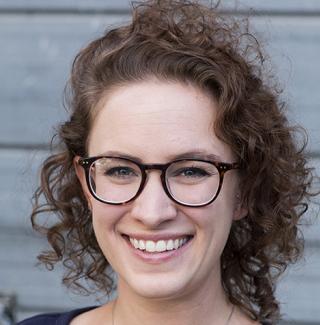Sarah Kolb Uses Strategic Communication Skills to Bring Attention to the Arts
Sarah Kolb is passionate about social justice and a strong believer in the value of arts and education. Since graduating with a Master's in Strategic Communication in 2016, Sarah has been balancing positions in two different nonprofit organizations in the Denver area. In this interview, she shares some thoughts about her work as a nonprofit communicator and about her experience as a graduate student in the Department of Media, Film and Journalism Studies.
What is your current professional position and what do you love about it?
After graduating with my master's in Strategic Communication, I ended up diving headfirst into Denver's nonprofit arts community, and it's been a constant thrill and challenge. I work in the marketing department of the Arvada Center for the Arts and Humanities, a multi-use arts and cultural center and the third largest theatre company in Colorado. Working for a multidisciplinary arts organization means that I'm always learning something new and figuring out how to best get other people excited about the really great cultural community in this city. I'm also the Social Media and Communications Coordinator for the Athena Project, a five-year-old nonprofit organization that celebrates women's artistic contributions to the Denver arts community.
How did your Master's degree and the networks you developed as a student prepare you for what you are doing now?
In the most direct way, I got in contact with the folks at the Athena Project because of a project I worked on during my master's studies. Two years later, I'm lucky enough to be involved and invested in shaping the direction of a developing nonprofit organization, which is a really exciting thing to be a part of. One of the most fulfilling things about the graduate program at MFJS is that it's both theoretical and practical, giving you the opportunity to understand not only how you structure communications campaigns, respond to crises, and connect with audiences, but why your approach may be effective or not. Having the opportunity to explore what interests me and matters to me in an academic setting puts the work I do now into a broader context—and this means that my work is that much more engaging intellectually.
What was your favorite thing about your graduate experience at the University of Denver?
The best part of the MFJS program at the University of Denver was unquestionably getting to learn and work with some of the greatest faculty members I've ever met, as well as the group of fellow students I got to know in the program. The program fostered a really supportive, inquisitive learning environment, which challenged and excited me. This backdrop, plus the opportunity to really dig into theoretical communication research and then to develop skills through hands-on, engaging practice, created a well-rounded understanding and experience for me.
What advice do you have for prospective students who are thinking about getting a Master's degree in Media and Public Communication at DU?
Do not limit yourself by being intimidated by what you don't know and use your educational experience as an opportunity to explore what you're interested in and may want to do in the future. Graduate school is a pretty unique opportunity to learn from and alongside people who have incredible life experiences and research interests outside of a structured work environment. I discovered that I'm really fascinated by some subjects that I would not have thought I'd enjoy learning about. Communications law, for example, is a class I would have been terrified to take on my own, but it ended up being a subject I'm really interested in, in addition to being very useful. Taking advantage of these opportunities and embracing the challenge of expanding what you know is one of the best parts of this program



